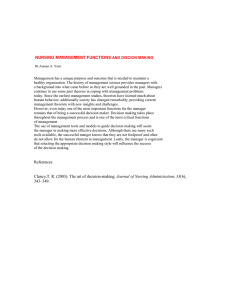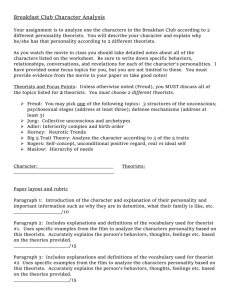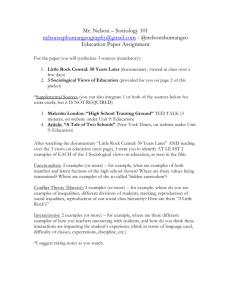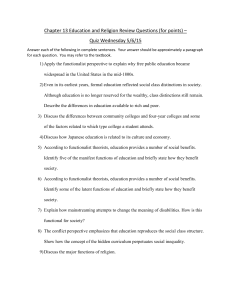Judy Innes Comments on the Dispute Resolution/Deliberative Democracy Seminar
advertisement
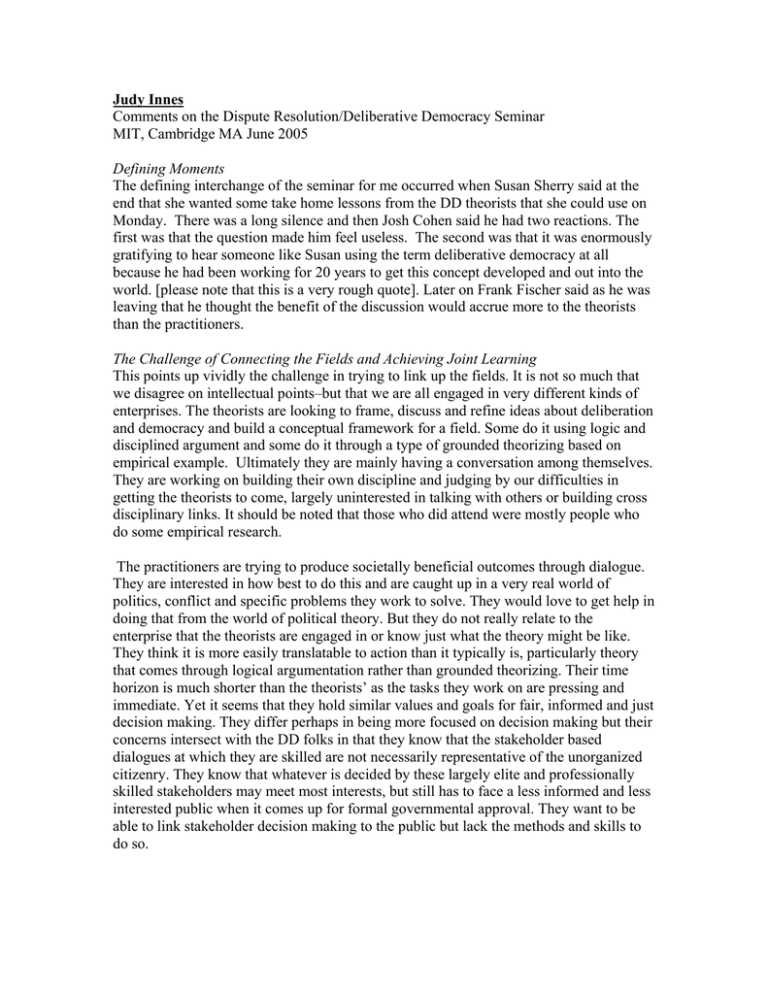
Judy Innes Comments on the Dispute Resolution/Deliberative Democracy Seminar MIT, Cambridge MA June 2005 Defining Moments The defining interchange of the seminar for me occurred when Susan Sherry said at the end that she wanted some take home lessons from the DD theorists that she could use on Monday. There was a long silence and then Josh Cohen said he had two reactions. The first was that the question made him feel useless. The second was that it was enormously gratifying to hear someone like Susan using the term deliberative democracy at all because he had been working for 20 years to get this concept developed and out into the world. [please note that this is a very rough quote]. Later on Frank Fischer said as he was leaving that he thought the benefit of the discussion would accrue more to the theorists than the practitioners. The Challenge of Connecting the Fields and Achieving Joint Learning This points up vividly the challenge in trying to link up the fields. It is not so much that we disagree on intellectual points–but that we are all engaged in very different kinds of enterprises. The theorists are looking to frame, discuss and refine ideas about deliberation and democracy and build a conceptual framework for a field. Some do it using logic and disciplined argument and some do it through a type of grounded theorizing based on empirical example. Ultimately they are mainly having a conversation among themselves. They are working on building their own discipline and judging by our difficulties in getting the theorists to come, largely uninterested in talking with others or building cross disciplinary links. It should be noted that those who did attend were mostly people who do some empirical research. The practitioners are trying to produce societally beneficial outcomes through dialogue. They are interested in how best to do this and are caught up in a very real world of politics, conflict and specific problems they work to solve. They would love to get help in doing that from the world of political theory. But they do not really relate to the enterprise that the theorists are engaged in or know just what the theory might be like. They think it is more easily translatable to action than it typically is, particularly theory that comes through logical argumentation rather than grounded theorizing. Their time horizon is much shorter than the theorists’ as the tasks they work on are pressing and immediate. Yet it seems that they hold similar values and goals for fair, informed and just decision making. They differ perhaps in being more focused on decision making but their concerns intersect with the DD folks in that they know that the stakeholder based dialogues at which they are skilled are not necessarily representative of the unorganized citizenry. They know that whatever is decided by these largely elite and professionally skilled stakeholders may meet most interests, but still has to face a less informed and less interested public when it comes up for formal governmental approval. They want to be able to link stakeholder decision making to the public but lack the methods and skills to do so. For Future Reference The interesting thing is that we got an overwhelmingly positive response from most of the people we invited. It was gratifying to hear the excitement and anticipation Friday night as people talked about their reasons for coming. It was gratifying too to see how the written comments reflect a very positive view of the meeting and the participants–who were a very distinguished bunch. Yet it remains clear that we need to offer a much better account of what those interested in DR can reasonably look for from the DD theorists and a much better account of what the DD theorists can gain from a conversation. Ultimately my hope is that we could at least understand each other’s language and preoccupations so that we can enrich each other’s work. I like Maarten’s idea of terrain sketching by each side as a next step. In hindsight I think it would have been a good idea to get a DD theorist to help design the conference and persuade other DD theorists to participate. It seems that the municipal scenario was a good one as it linked quite closely to what DD theorists think about. The regional housing one seemed to work well. My sense though I missed some of the discussion was that the national scenario was of less interest to them perhaps because DD is usually is more linked to the grassroots deliberation. The last for some reason did not seem to generate the quality of dialogue and I wonder if that is because it is difficult for some of those who operate largely in a world of theory with its own rules and questions to relate well to such a specific problem and task. I think a DD theorist would have designed a very different set of scenarios. Reactions to others’ Comments The thoughtful comments I read by others triggered a number of reactions and questions for me. A couple of people said there was inevitably bias in the stakeholder processes and David Kahane said something about the work being by definition unjust and incomplete but he did not say how. [nor of course compare it to the alternative] I recognize the general idea that there is bias in any organizational form, but I would like us to think about and discuss what that bias is or might be. Perhaps it is bias toward people who are better deliberators, or interests that are by their nature better able to organize [unlike Mancur Olson’s diffuse public]. Perhaps it is bias toward representativeness [is that bias?] toward empowering the less empowered or challenging the status quo and existing authority? Perhaps it is a bias against the people who are not there [but it is not bias if this cannot be identified in any systematic way.] Is it a bias toward closure? [that would not be true of many types of collaborative processes and public dialogues] In any case I think this is an important discussion to have if not with DD theorists then among the rest of us. It is a serious potential critique that needs to be addressed head-on. One thing it seems nobody talked much about was capacity–the capacity of a community to govern themselves, to participate in dialogue or dispute resolution processes. It seems that DR does build capacity, as do the processes of public dialogue. If this is true how do we look at the issues differently. Maybe it is a gradual and iterative process to build the type of citizenry we need. Josh Cohen’s point about how a decision does not necessarily mean closure. One of the people I interviewed in my research said “consensus building is forever.” Well run consensus building processes often continue long beyond a decision in various forms. They come to realize that implementation will be a negotiation and that times will change and it will continue to be important to have multiple voices attentive to the issues and a forum for them to sort out emergent problems and deal with new information. It would be important for us if we try to move forward with this to pay attention to John Dryzek’s explanation of the different locations for deliberative democracy. This might have helped us with the design of the scenarios.

